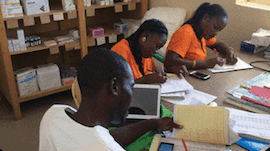Research Explores When Outsourcing Health Logistics Makes Sense
Thursday, October 6, 2016
Outsourcing logistical tasks to the private sector could be a key to drastically improving public health supply chains and increasing access to vital health products in developing countries, according to new research co-authored by WDI Senior Research Fellow Prashant Yadav.

Yadav and his co-authors cite successes in Senegal after the government hired third-party logistics providers to manage orders and handle deliveries of family planning medicines and supplies from district warehouses to local health facilities. Their peer-reviewed article, “Moving Medicine, Moving Minds: Helping Developing Countries Overcome Barriers to Outsourcing Health Commodity Distribution to Boost Supply Chain Performance and Strengthen Health Systems,” was published in the September issue of the journal Global Health: Science and Practice.
Within the first six months of the three-year program, inventory shortages (or “stock-outs”) for items such as contraceptives and implants went from more than 80 percent to less than 2 percent. Additionally, distribution costs declined 36 percent through outsourcing, compared with the paying government health employees to perform essentially the same functions, the research shows.
Supported by Merck for Mothers, The Bill and Melinda Gates Foundation, IntraHealth International, and other partners, the project also implemented an inventory management system and new data tracking that supported mobile warehousing, which made restocking medicines and other health products more responsive to actual consumption. (Unlike a traditional model where inventory is kept in warehouses and trucks are filled based on what clinics order, mobile warehousing uses trucks to bring inventory directly to multiple clinics to replenish their stock.)

Prashant Yadav, WDI Senior Research Fellow
“Well functioning supply chains are critical to ensure availability of medicines and health products,” Yadav said. “Government-run programs play an important role in ensuring equity and efficiency. However, running transport and
distribution in an environment of demand uncertainty and infrastructure constraints requires agile operations, which only the private sector can provide.
“This article highlights the opportunities and challenges that exist in outsourcing select supply chain functions to the private sector,” he said.
The article’s authors caution that third-party outsourcing alone is not a panacea for supply chain challenges, noting that success ultimately depends on a strong government commitment, and clear roles for public and private players. Outsourcing logistical work may also benefit patients by freeing up doctors, nurses, and clinical staff to focus more closely on providing care.
In addition to looking at the many advantages of hiring third-party logistics providers, the authors also examine obstacles that block progress and the best ways to overcome them.
“The success of the (third-party logistics provider) approach in Senegal demonstrates the power of private sector engagement in supply chain reform,” said Priya Agrawal, director of vaccines and women’s health for MSD UK, and a co-author of the article. “It has also contributed to creating jobs and entrepreneurs which is a wonderful unintended consequence. Promoting and improving maternal and reproductive health, and reducing preventable maternal deaths, depends on the ability of women everywhere to get the modern contraceptives they want, where they want them and when they want them. As donors and global health advocates, we must continue to support government leaders, and lend our expertise, as they figure out how to make that happen.”
In addition to Yadav and Agrawal, the other authors are: Iain Barton, of Imperial Health Sciences; Roberto Dal Bianco, of Merck & Co.; and, Dana Hovig and David Sarley, of The Bill and Melinda Gates Foundation.
